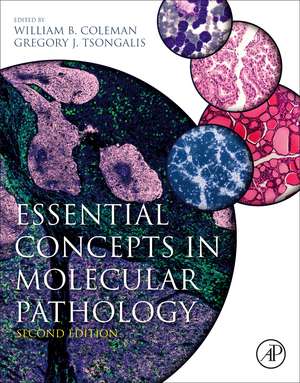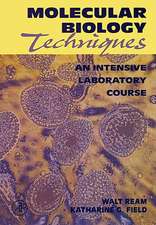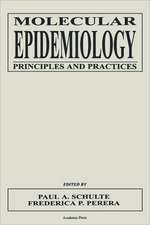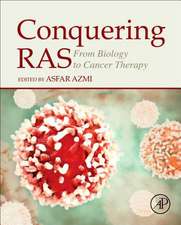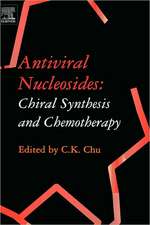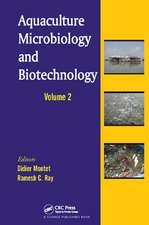Essential Concepts in Molecular Pathology
Editat de William B. Coleman, Gregory J. Tsongalisen Limba Engleză Paperback – 25 noi 2019
By bridging molecular concepts of pathogenesis to the clinical expression of disease in cell, tissue and organ, this fully updated, introductory reference provides the background necessary for an understanding of today’s advances in pathology and medicine.
- Explains the practice of "molecular medicine" and the translational aspects of molecular pathology, including molecular diagnostics, molecular assessment and personalized medicine
- Orients non-pathologists on what pathologists look for and how they interpret their observational findings based on histopathology
- Provides the reader with what is missing from most targeted introductions to pathology—the cell biology behind pathophysiology
| Toate formatele și edițiile | Preț | Express |
|---|---|---|
| Paperback (1) | 488.62 lei 5-7 săpt. | |
| ELSEVIER SCIENCE – 25 noi 2019 | 488.62 lei 5-7 săpt. | |
| Hardback (1) | 328.92 lei 5-7 săpt. | |
| ELSEVIER SCIENCE – 15 feb 2010 | 328.92 lei 5-7 săpt. |
Preț: 488.62 lei
Preț vechi: 686.04 lei
-29% Nou
Puncte Express: 733
Preț estimativ în valută:
93.50€ • 98.32$ • 77.26£
93.50€ • 98.32$ • 77.26£
Carte tipărită la comandă
Livrare economică 10-24 aprilie
Preluare comenzi: 021 569.72.76
Specificații
ISBN-13: 9780128132579
ISBN-10: 0128132574
Pagini: 634
Dimensiuni: 216 x 276 x 34 mm
Ediția:2
Editura: ELSEVIER SCIENCE
ISBN-10: 0128132574
Pagini: 634
Dimensiuni: 216 x 276 x 34 mm
Ediția:2
Editura: ELSEVIER SCIENCE
Public țintă
Biomedical graduate students, allied health students, medical students studying pathology, human disease, and the translational aspects of basic science; residents and postdoctoral fellows in pathology, laboratory medicine, and internal medicine; practicing basic scientists and physician scientists.Cuprins
PART I Essential Pathology - Mechanisms of Disease
1. Molecular Mechanisms of Cell Death
2. Acute and Chronic Inflammation
3. Infection and Host Response
4. Neoplasia
PART II Concepts in Molecular Biology and Genetics
5. Basic Concepts in Human Molecular Genetics
6. The Human Genome: Implications for the Understanding of Human Disease
7. The Human Transcriptome: Implications for the Understanding of Human Disease
8. The Human Epigenome: Implications for the Understanding of Human Disease
9. Clinical Proteomics and Molecular Pathology
10. Integrative Systems Biology: Implications for the Understanding of Human Disease
11. Pathology: The Clinical Description of Human Disease
12. Molecular Pathogenesis: The Biological Basis of Human Disease and Implications for Improved Treatment of Human Disease
13. Integration of Molecular and Cellular Pathogenesis
PART IV Molecular Pathology of Human Disease
14. Molecular Basis of Cardiovascular Disease
15. Molecular Basis of Hemostatic and Thrombotic Diseases
16. Molecular Basis of Lymphoid and Myeloid Diseases
17. Molecular Basis of Diseases of Immunity
18. Molecular Basis of Pulmonary Disease
19. Molecular Basis of Diseases of the Gastrointestinal Tract
20. Molecular Basis of Liver Disease
21. Molecular Basis of Diseases of the Exocrine Pancreas
22. Molecular Basis of Diseases of the Endocrine System
23. Molecular Basis of Gynecologic Diseases
24. Molecular Pathogenesis of Kidney Diseases
25. Molecular Pathogenesis of Prostate Cancer: Somatic, Epigenetic, and Genetic Alterations
26. Molecular Biology of Breast Cancer
27. Molecular Basis of Skin Disease
28. Molecular Pathology: Neuropathology
PART V Practice of Molecular Medicine
29. Molecular Diagnosis of Human Disease
30. Molecular Assessment of Human Disease in the Clinical Laboratory
31. Pharmacogenomics and Personalized Medicine in the Treatment of Human Disease
1. Molecular Mechanisms of Cell Death
2. Acute and Chronic Inflammation
3. Infection and Host Response
4. Neoplasia
PART II Concepts in Molecular Biology and Genetics
5. Basic Concepts in Human Molecular Genetics
6. The Human Genome: Implications for the Understanding of Human Disease
7. The Human Transcriptome: Implications for the Understanding of Human Disease
8. The Human Epigenome: Implications for the Understanding of Human Disease
9. Clinical Proteomics and Molecular Pathology
10. Integrative Systems Biology: Implications for the Understanding of Human Disease
11. Pathology: The Clinical Description of Human Disease
12. Molecular Pathogenesis: The Biological Basis of Human Disease and Implications for Improved Treatment of Human Disease
13. Integration of Molecular and Cellular Pathogenesis
PART IV Molecular Pathology of Human Disease
14. Molecular Basis of Cardiovascular Disease
15. Molecular Basis of Hemostatic and Thrombotic Diseases
16. Molecular Basis of Lymphoid and Myeloid Diseases
17. Molecular Basis of Diseases of Immunity
18. Molecular Basis of Pulmonary Disease
19. Molecular Basis of Diseases of the Gastrointestinal Tract
20. Molecular Basis of Liver Disease
21. Molecular Basis of Diseases of the Exocrine Pancreas
22. Molecular Basis of Diseases of the Endocrine System
23. Molecular Basis of Gynecologic Diseases
24. Molecular Pathogenesis of Kidney Diseases
25. Molecular Pathogenesis of Prostate Cancer: Somatic, Epigenetic, and Genetic Alterations
26. Molecular Biology of Breast Cancer
27. Molecular Basis of Skin Disease
28. Molecular Pathology: Neuropathology
PART V Practice of Molecular Medicine
29. Molecular Diagnosis of Human Disease
30. Molecular Assessment of Human Disease in the Clinical Laboratory
31. Pharmacogenomics and Personalized Medicine in the Treatment of Human Disease
Recenzii
"This is a well-illustrated, easy-to-read book perfectly geared toward aspiring and practicing pathologists. With the growing use of high throughput technologies by medical laboratories, clinicians increasingly rely on genomic, epigenomic, transcriptomic, and proteomic data to classify disease, predict patient outcomes, select therapy, and monitor response to treatment. This book illustrates how scientific discoveries have improved our understanding of disease and catalyzed the era of molecular-guided precision medicine. By highlighting landmark collaborative efforts like the Human Genome Project and new technologies on the horizon, it offers both historical and future-oriented perspectives on the rapidly growing field of genomic medicine. Overall, I would highly recommend this comprehensive textbook to those interested in molecular pathology." --Doody Reviews
Praise for the first edition:
"The book is compact, easy to follow, filled with useful tables and figures and deserves reading by students and professionals interested in the molecular basis of disease." --Howard Reisner PhD, Professor of Pathology and Laboratory Medicine, University of North Carolina at Chapel Hill, North Carolina, USA
"Finally, a book that captures the real world environment of molecular diagnosis and pathology…is available in Essential Concepts in Molecular Pathology! --Rodney E. Rohde, MS, SV, SM, MP (ASCP), Associate Professor, Texas State University-San Marcos, Clinical Laboratory Science, San Marcos, TX, USA
Praise for the first edition:
"The book is compact, easy to follow, filled with useful tables and figures and deserves reading by students and professionals interested in the molecular basis of disease." --Howard Reisner PhD, Professor of Pathology and Laboratory Medicine, University of North Carolina at Chapel Hill, North Carolina, USA
"Finally, a book that captures the real world environment of molecular diagnosis and pathology…is available in Essential Concepts in Molecular Pathology! --Rodney E. Rohde, MS, SV, SM, MP (ASCP), Associate Professor, Texas State University-San Marcos, Clinical Laboratory Science, San Marcos, TX, USA
